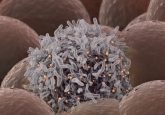Hepatoblastoma tumor resection: can it be done earlier?

Hepatoblastoma is the most common malignant tumor of the liver in children under the age of 5 years. Surgical resection is essential for cure, and the primary tumor can be resected either immediately or following chemotherapy. Researchers from Children’s Hospital Los Angeles (CA, USA), including senior investigator Leo Mascarenhas, have recently assessed how chemotherapy may affect the resectability of primary hepatoblastoma tumors in pediatric patients.
Thirty percent of tumors are too large to be resected initially and need to be reduced in size by chemotherapy before surgery can be carried out. Resection after four rounds of chemotherapy is preferable as there are many adverse side effects to the treatment, such as cardiac problems, decreased kidney function and depleted hearing.
However, prior research has shown that the effectiveness of chemotherapy may plateau after two rounds, and if the tumor can be surgically managed at this point then surgery should be performed. If after four rounds the tumor is not amenable to resection, liver transplantation should be pursued rather than continuation of chemotherapy.
Mascarenhas and his colleagues tested their hypothesis that if resection could not be carried out after two rounds of chemotherapy, further chemotherapy would not improve the resectability of the tumor. The surgeons reviewed radiographic images from 20 pediatric patients with advanced hepatoblastoma who had been treated at Children’s Hospital Los Angeles between 1991 and 2008.
After review of all scans (57 scans of 20 patients), the surgeons classified four tumors as unresectable after four rounds of chemotherapy. At diagnosis, 80% of tumors were unresectable, and this decreased to 35% after two cycles, and to 20% after four cycles of chemotherapy.
“Nearly half of the tumors considered inoperable after just two cycles of chemotherapy were actually resectable after four,” explained Mascarenhas. “This is in contrast to our own hypothesis, based on prior observations of tumor response to chemotherapy.”
Currently, four rounds of chemotherapy are given to patients who have had surgical resection subsequent to an initial two rounds of chemotherapy. This investigation suggests that surgery can actually be attempted after two rounds of chemotherapy in a large number of cases, and that early surgery and reduced exposure to chemotherapy after surgery could lead to a reduction in chemotherapy-related complications.
Source: Venkatramani R, Stein JE, Sapra A et al. Effect of neoadjuvant chemotherapy on resectability of stage III and IV hepatoblastoma. Br. J. Surg. doi:10.1002/bjs.9681 (2014) (Epub ahead of print); Children’s Hospital Los Angeles press release




